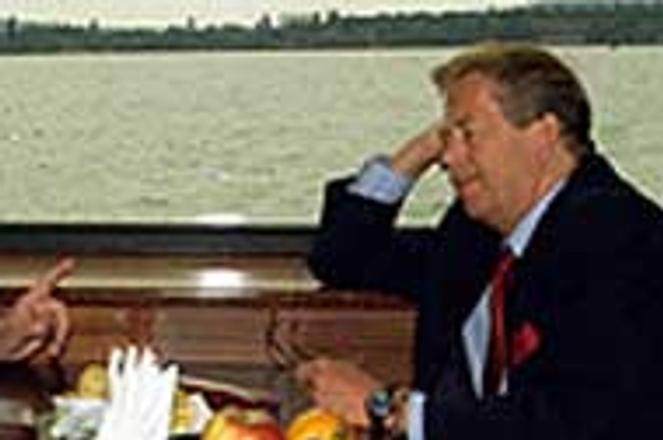President Rudolf Schuster (left) and Czech President Václav Havel suffer from the same condition.photo: TASR
President Rudolf Schuster underwent surgery early June 19 to heal a perforated large intestine, a procedure that attending doctors from the Interior Ministry called "a life saving measure" to rescue the patient. Schuster, who had been hospitalised last week with a high fever, is expected to remain in hospital for at least two weeks.
Schuster's wife Irena reported that the President was "weak" after the procedure, and suffering from "a certain amount of mental confusion" due to the after-effects of anaesthesia. She said she had been "surprised and shocked" by the sudden dramatic decline in her husband's condition, which she and the president's personal physician František Samsely had originally thought was due to something he had eaten.
Instead, Schuster's fever was caused by a tear in his large intestine, causing internal bleeding and contamination of the abdominal cavity, as well as severe dehydration. Following a brief improvement, Schuster went into a decline on June 18; unable to delay further or move the patient, a team of doctors led by Interior Ministry hospital president František Fabian operated around midnight, removing a 25 centimetre section of intestine, and were joined shortly before 3 a.m. by top Slovak surgical specialist Július Vajó. The hospital has since refused to divulge information about the operation.
The president's illness invited speculation as to when he might return to active duty. At the moment, many of Schuster's duties are being carried out by his head of office, but some presidential functions - such as signing laws into effect - cannot be delegated. In the event that the president is unable to perform his duties for six months, the Constitutional Court is by law required to declare the presidency vacant, after which new elections would be called.
The question of the 66 year-old Schuster's ability to discharge his duties is important not only because of his place in Slovakia's executive power structure, but also because the current June session of parliament is expected to pass a series of laws (the Bankruptcy Law, a bill creating an independent financial markets regulator) vital for the country's economic reform and accession to the OECD. If the laws are not signed into effect by the president within 15 days of their passage, then they automatically return to parliament, which does not sit again until September.
But Grigorij Mesežnikov, president of the Bratislava thinktank Institute for Public Affairs (IVO), said that these fears were more of a theoretical than a practical nature. "I suppose, if he were unconscious and unable to carry out his duties for six months, there would have to be new elections, but in reality he can sign laws just as well from his hospital bed," he said.
While he would not predict the length of time Schuster would need to recover, personal physician Samsely said the president did not appear to be suffering from a long-term illness such as cancer, and agreed that there was no reason he could not sign laws into effect from home upon his release from hospital. The results of diagnostic tests were to be known towards the end of this month.
News of Schuster's illness also brought words of concern from the Czech, Polish and Hungarian presidents as well as Slovak politicians from both sides of parliament. Czech President Václav Havel, who in 1998 underwent surgery for the same condition, sent a telegram saying "I have faith that the news from Bratislava will be good. I wish you much strength, and I look forward to our next meeting."
Missing element?
The president's absence will be felt in domestic politics, according to Oĺga Keltošová, an MP with the opposition HZDS party. Since taking office a year ago, Schuster has tried to use his post to smooth over divisions on Slovakia's polarised political landscape, giving audiences to officials from various parties and trying to bring all together at a political round table.
"He [Schuster] is indispensable in this rocky situation," said Keltošová. "I'm thinking mainly about the proposed round table."
But according to Mesežnikov, the president did not occupy such a vital role on the domestic scene that parliament would suffer in his absence. "He is not irreplaceable, and he doesn't have any real impact on the internal workings of parties," he said. "Of course it is always better when the head of state is healthy and in his office, but the effects of his absence shouldn't be dramatic."



